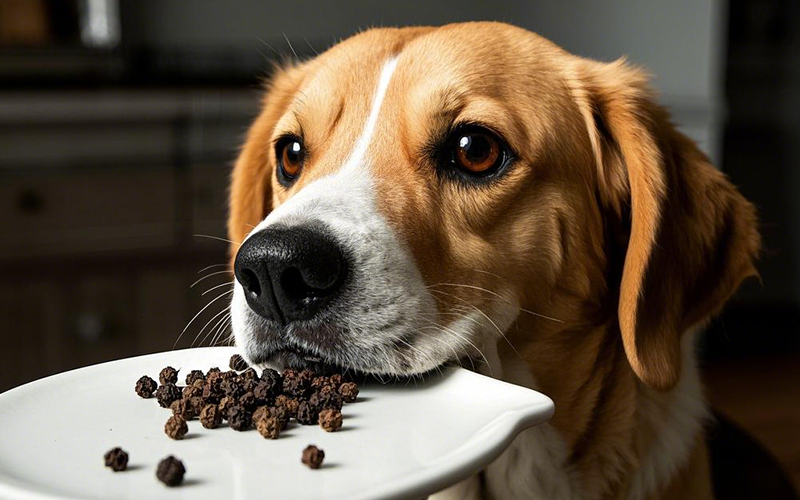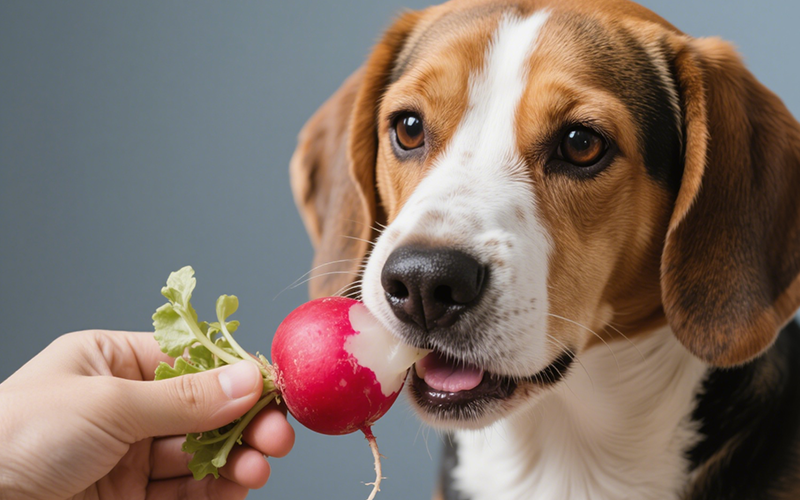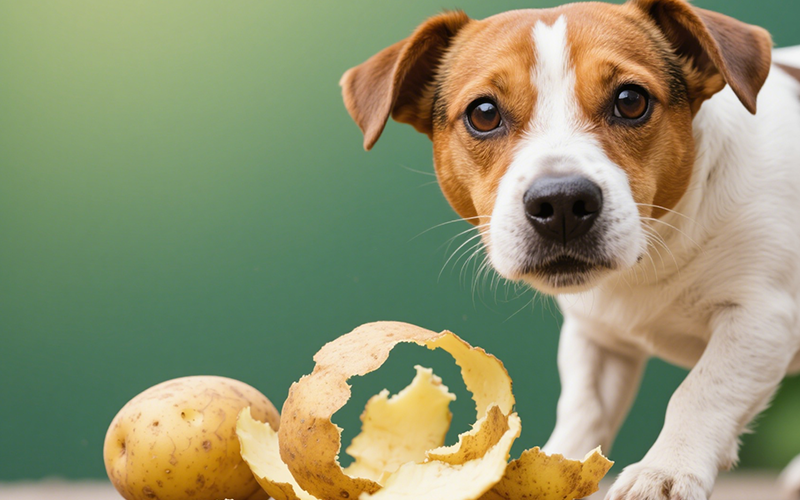Can Dogs Eat Black Pepper? Understanding the Safety of Spicy Seasonings for Your Pet
- 12 Mar 2025 13:42
As a pet owner, you may be curious about whether certain human foods are safe for your dog. One common seasoning found in many kitchens is black pepper. While it might seem harmless in small amounts, it's important to understand how it affects your dog. So, can dogs eat black pepper? Let’s explore the potential risks and benefits of this common spice for our furry friends.

The Risks of Black Pepper for Dogs 🌶️
Although black pepper is not as harmful as some other spices (like garlic or onion), it can still cause discomfort or irritation to your dog. Here are a few reasons why black pepper might not be the best choice for your pet:
1. Digestive Irritation 🤢
Dogs’ digestive systems are different from ours, and spicy foods like black pepper can irritate their stomach lining. Consuming even small amounts of black pepper may lead to upset stomach, vomiting, or diarrhea in some dogs. If your dog has a sensitive stomach or existing gastrointestinal issues, it’s best to avoid feeding them anything with black pepper.
2. Respiratory Issues 😷
Black pepper has a strong aroma, and if inhaled in large amounts, it can irritate your dog’s respiratory system. If your dog is exposed to a significant amount of pepper dust, it may experience coughing, sneezing, or difficulty breathing. This is more likely to happen if black pepper is sprinkled directly onto food or if your dog accidentally sniffs it.
3. Choking Hazard ⚠️
While this isn’t as common, whole black peppercorns can pose a choking hazard for dogs, especially small breeds. The peppercorns are hard and could cause an obstruction if swallowed without being properly chewed.
4. Potential for Spicy Sensations 🌶️
Dogs don’t tolerate spice the way humans do. While black pepper isn’t as spicy as some other foods, it can still cause discomfort to your dog’s taste buds and digestive system. They may show signs of discomfort, like excessive drooling, licking their lips, or pawing at their mouths.
When Should You Avoid Giving Your Dog Black Pepper?
While small amounts of black pepper might not pose a major health threat to most dogs, there are certain situations where it’s best to completely avoid it:
1. Dogs with Sensitive Stomachs 🐾
If your dog has a history of digestive issues, such as upset stomachs, vomiting, or diarrhea, it’s best to avoid feeding them foods seasoned with black pepper. Even small amounts can trigger discomfort or worsen existing conditions.
2. Puppies and Senior Dogs 🍼
Puppies and older dogs tend to have more sensitive digestive systems. Pepper, even in small amounts, could cause them more distress compared to healthy adult dogs.
3. Choking Concerns with Small Dogs 🐩
If you have a small dog or one that tends to gulp food quickly, black peppercorns (or even large amounts of ground pepper) can be a choking hazard. Always be cautious when serving any type of seasoning or spice to small dogs.
Are There Any Benefits of Black Pepper for Dogs?
In general, black pepper doesn’t offer significant health benefits to dogs, and the potential risks outweigh any possible positive effects. However, some believe that black pepper has mild antimicrobial and antioxidant properties, but these effects are likely too small to make a meaningful difference in your dog's health. Additionally, most of these benefits are available through safer and more dog-friendly alternatives.
Safe Alternatives to Black Pepper for Dogs 🍏
If you want to add flavor or a little variety to your dog’s diet, there are safer options to consider instead of black pepper:
1. Carrots 🥕
Carrots are crunchy, low-calorie, and full of fiber and vitamins. They make an excellent, dog-friendly treat that can help with dental health and provide a satisfying crunch.
2. Apple Slices 🍏
Apples (without seeds or cores) are a healthy and refreshing treat for dogs. They are full of fiber and Vitamin C, making them a nutritious choice.
3. Sweet Potatoes 🍠
Sweet potatoes are rich in fiber and antioxidants, making them a healthy addition to your dog's diet. Cooked and sliced, they make a great snack or even a main ingredient in homemade dog treats.
4. Pumpkin 🎃
Pumpkin is packed with fiber and great for your dog’s digestion. It’s mild, safe, and can be served as a treat or added to your dog’s meals.
5. Cucumbers 🥒
Cucumbers are low in calories and provide hydration. They are a cool, crisp treat that is safe for dogs to eat in moderation.
What to Do if Your Dog Eats Black Pepper
If your dog accidentally eats black pepper or food seasoned with it, here are the steps you should take:
1. Observe for Symptoms 👀
Keep an eye on your dog for signs of digestive upset, such as vomiting, diarrhea, or excessive drooling. If your dog is acting normally after ingesting a small amount of black pepper, there's no need to worry too much.
2. Call Your Veterinarian 📞
If your dog has ingested a large amount of black pepper or if you notice any signs of distress—such as difficulty breathing, excessive coughing, or choking—contact your vet immediately. In such cases, your vet can provide guidance or suggest treatment options to ensure your dog’s safety.
3. Prevent Future Incidents 🚫
To avoid any issues, make sure that black pepper and other spices are stored securely and out of reach of your dog. Be cautious when preparing food and be mindful of accidentally seasoning your dog’s meals.
PettureX: Your Pet Health Assistant 🐾
If you’re ever uncertain about what’s safe for your dog to eat, PettureX, an AI-powered pet health assistant, can offer 24/7 advice. Whether you’re unsure about feeding your dog black pepper or need help with general pet care, PettureX is available to provide you with reliable and accurate information.
Conclusion
Can dogs eat black pepper? While small amounts of black pepper are unlikely to cause significant harm, it’s not the best choice for your pet. Black pepper can cause digestive issues, respiratory discomfort, and choking hazards. If your dog does ingest black pepper, watch for signs of distress and contact your veterinarian if necessary.
Instead, opt for dog-friendly snacks like carrots, apples, or sweet potatoes to safely add variety to your dog’s diet. And remember, if you ever have questions about your pet’s health or diet, PettureX is always ready to assist you. 🐕🌶️
Related

Radish Bites for Your Buddy? A Vet-Reviewed Guide on Whether Dogs Can Eat Radishes
- 22 Apr 2025
Potato Peels for Pooches? Unpeeling the Risks and Facts for Dog Owners
- 22 Apr 2025
Crunchy Curiosity: Can Dogs Safely Snack on Pork Rinds? A Deep Dive
- 21 Apr 2025
Pomegranate Seeds and Pooches: A Deep Dive into Whether Dogs Can Safely Indulge
- 21 Apr 2025
Can Dogs Eat Peaches? Vet Explains Benefits, Cyanide Risks & Safe Serving
- 16 Apr 2025
Can Dogs Eat Mulberries? Vet Explains Safety, Benefits & Potential Risks
- 16 Apr 2025
Can Dogs Eat Mozzarella? Vet Explains the Cheesy Truth (Risks & Benefits)
- 16 Apr 2025
Can Dogs Eat Maple Syrup? The Sugary Truth & Why Vets Advise Against It
- 16 Apr 2025
Can Dogs Eat Mango Skin? Vet Explains Why It's a Risky Chew!
- 16 Apr 2025
Can Dogs Eat Mac n Cheese? Vet Explains Why This Comfort Food Is Unsafe!
- 16 Apr 2025
